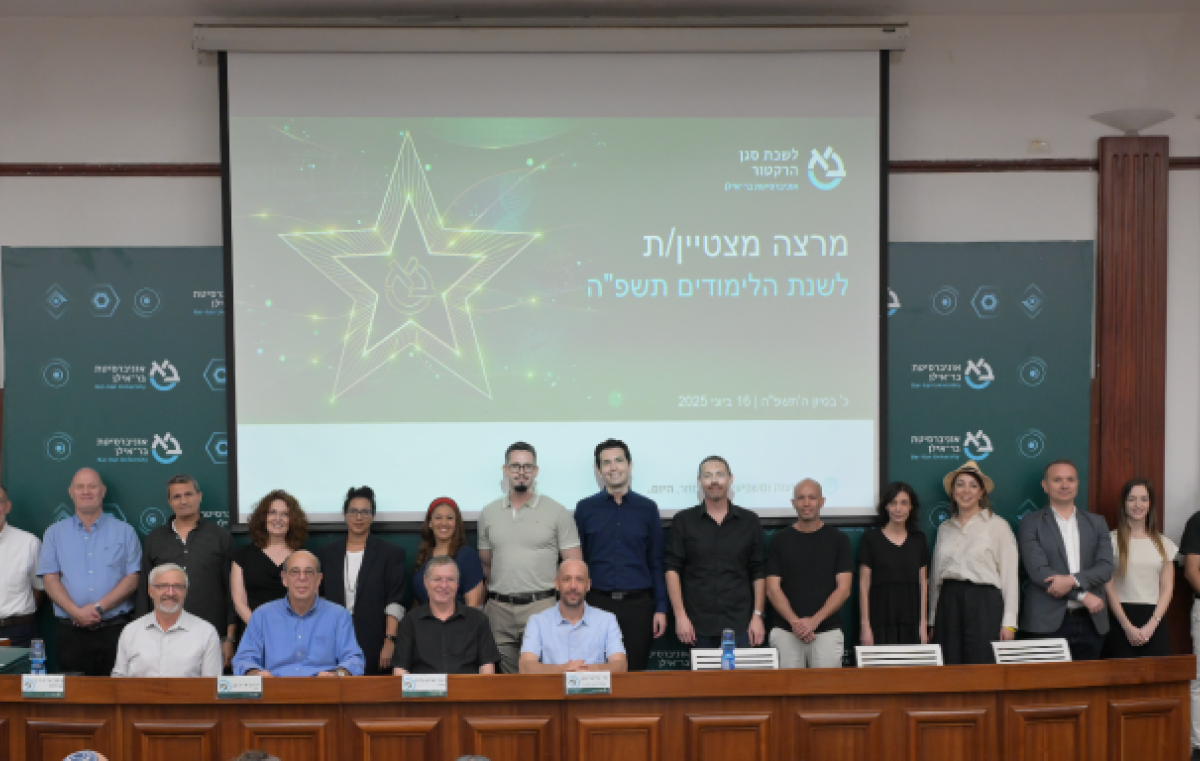2025 Teaching Excellence Awards
17 educators, representing a wide range of faculties and disciplines, are shaping not only the future of their fields but also the minds and hearts of the next generation.

Seventeen outstanding lecturers at Bar-Ilan University have been recognized with the 2025 Teaching Excellence Award for their innovation in teaching, active involvement in improving departmental learning, and exceptionally high levels of student satisfaction in the university’s annual teaching surveys.
The Moments That Make Teaching Meaningful
Prof. Stas Borov (Department of Physics) describes his favorite moments in the classroom:
“When you try to explain an abstract mathematical or physical concept and suddenly see that flash of understanding on a student’s face; that moment when they see the beauty you see. That’s when you know you’ve truly connected.”
Dr. Limor Gabay-Egozi (Department of Sociology and Anthropology) recalls a special moment outside the university walls:
“I once met a former student who now teaches at my son’s school. She told her class that I’m the lecturer who always said, ‘Mistakes are opportunities.’ Hearing that was deeply moving.”
For Dr. Elai Rettig (Department of Political Science), the magic often happens beyond the lecture hall:
“Every time I get a message from a former student, it reminds me that I’ve been a positive influence in their life. Those are the moments that matter most.”
Dr. Uri Sharon (Faculty of Law) shares a powerful story:
“A former student once told me that the project he developed under my guidance led him to found a renewable energy startup. Seeing how an academic idea became something that benefits society and the environment was incredibly rewarding.”
The Joy of Recognition
For Dr. Ilya Ulevsky-Arad (Department of Chemistry), the highlight comes at the end of each semester:
“When the final topic is done, the students clap, come up to talk, and share what they felt during the course, those moments of gratitude and connection are everything.”
Avital Fried-Cohen (Department of Physics) adds:
“I once taught a very difficult course where students were anxious about failing. I worked hard to make the material clear, recorded sessions, answered every question. When I saw their feedback at the end of the semester—it was full of appreciation. That meant the world to me.”
If They Weren’t Lecturers...
Many of the awardees shared what they might have done if they hadn’t chosen academia.
Prof. Danny Horash (Department of Psychology) said:
“If I weren’t a university lecturer, I’d probably be a veterinarian. It’s something I’ve always found fascinating and meaningful.”
Dr. Limor Gabay-Egozi admits she once dreamed of traveling the world:
“When I was younger, I wanted to be a tour guide abroad. In a way, I still get to travel, attending conferences, meeting colleagues, and exploring ideas.”
Dr. Elai Rettig imagines himself in diplomacy:
“I’d probably be in the Foreign Ministry, representing Israel abroad.”
Dr. Uri Sharon believes he’d still be fighting for change:
“Most likely, I’d be an environmental lawyer, an activist working to protect the planet.”
And Nadav Toledano (Faculty of Medicine) says that even while practicing physiotherapy, he still makes time for his other passion: writing.
A Family Legacy of Teaching
For some, teaching runs in the family.
Dr. Gassan Muadi (Faculty of Medicine) explains:
“I come from a family where education is part of who we are. My father taught Arabic for many years, my brother and sisters are teachers—it’s in our DNA.”
What Makes a Great Teacher?
Dr. Helit Arel-Brodsky (School of Social Work) believes passion is key:
“My love for the field is contagious, it walks into the room with me.”
Dr. Shay Bel (Faculty of Medicine) agrees:
“I think I was chosen for one simple reason: I love what I teach.”
Dr. Ilya Ulevsky-Arad adds:
“I’m deeply passionate about what I do, and I love sharing that excitement with others.”
Dr. Eliyahu Elsheikh (Department of Middle Eastern Studies) says:
“A great teacher makes the material relevant to students’ lives. Emotion is a big part of learning—it takes engagement to another level.”
Prof. Stas Borov adds:
“It’s about caring—caring that students leave the lecture feeling that things were clear and meaningful.”
The Magic of the Classroom
Dr. Clila Magen (School of Communication) captures the essence of the classroom experience beautifully:
“There’s magic in it. The material is always the same, but each class breathes differently—it’s alive, dynamic, constantly renewing itself.”
Dr. Shani Levi-Shimon (Faculty of Education) adds:
“I love what I teach and believe deeply in it. The knowledge itself matters, but so does its power to shape human growth.”
Redefining “Excellence”
Prof. Kimi Kaplan (Department of Jewish History) defines an excellent student as:
“One who doesn’t give up, who argues, who isn’t afraid to disagree.”
For Avital Fried-Cohen:
“An excellent student is intelligent, hardworking, and curious.”
And Dr. Arel-Brodsky quotes poet Eeva Kilpi: “Those with an open mind—those who know how to ask questions.”
Innovation and Growth
Dr. Esther Schupak (Department of English Literature and Linguistics) places innovation at the center of her teaching:
“To keep teaching alive, it has to evolve—through technology, new methods, and creative ideas.”
She recalls an especially memorable class project:
“My students created a chatbot based on Shakespeare’s characters! I’m thrilled that AI tools now allow us to enrich learning and prepare students for the future.”
The Heart of Excellence
The award-winning lecturers of Bar-Ilan University prove that exceptional teaching grows at the intersection of deep knowledge, authentic passion, and the courage to evolve. They don’t just teach—they shape lives, inspire minds, and remind us that while the material may change, the human connection at the heart of learning never does.
In addition to the individual awards, the Department of Jewish Philosophy and the School of Education received institutional honors for excellence in teaching.
Honorable mentions were also given to the Department of Arabic, Department of Criminology, Department of Physics, and English as a Foreign Language Unit.